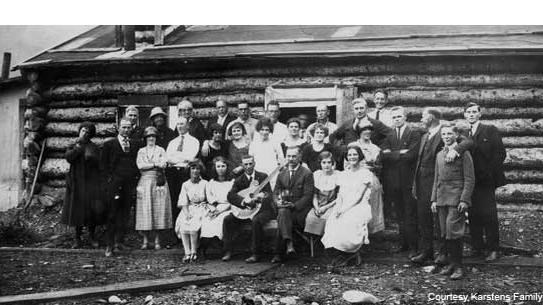Last updated: October 16, 2020
Place
McKinley Station

Henry P. Karstens Collection, 0636, Karstens Library
Cellular Signal
Over 100 years ago—during an era of gold prospectors, trappers, hunters, and pioneer rangers—the surrounding land looked very different than it does now. Rather than forest, you would have seen open country, covered with low ground cover.
McKinley Station was typical of Alaska towns of that era, booming overnight then fading into obscurity. Construction of the Alaska Railroad provided the original stimulus for the community and the development of the new park kept it going. Expediency, not stewardship, was the frontier byword. Throughout the 1920s, about 60 people over-wintered in McKinley Station, with dozens more in summer residence. Year-round employment was scarce, seasonal construction and tourism jobs the source of much needed cash. Despite the sometimes boisterous and rollicking nature of the village, a one-room schoolhouse existed and a hotel hosted a variety of relatively genteel social gatherings. Nearby, a trading post, a fox-farming enterprise, and the railroad depot offered occasional work for residents.
When Mount McKinley National Park was founded in 1917, most locals considered it a passing fancy. Alaskans of that era viewed conservation as an impediment to the exploitation of the territory’s natural resources. They viewed national parks as playgrounds for over-privileged easterners, and resented new restraints. For four long years, the park existed in name only, without protection of any kind. In 1921, Congress finally appropriated funds to hire rangers to enforce park boundaries and poaching regulations. When the park’s first superintendent began building headquarters on the banks of Riley Creek, he was met with open hostility, and disdain.
In 1932, less than 20 years after it emerged, McKinley Station effectively ceased to exist when park boundaries expanded east to the Nenana River, enveloping the community. Harsh winters and seasonal changes have all but erased McKinley Station. Except for cabin berms, trash dumps, and varied debris, little is left today.
